QuestionQUESTION: Hi
We were at an event this week and some rabbits got sick. One had wry neck and one had coccidia. Both died however the committee in charge of the animals did not bother to clean the cages properly and 2 of my children's bunnies ended up coming down with coccidia and they both tragically died.
The committee in charge cleaned the cages with lysol. I do not believe that lysol is an effective method of killing oocysts or pastuerella. Do you have any literature that I can point them to so that they may actually believe me? I told them that the coccidia could live over a year in those cages but they just didn't care what I thought. Now since we had two rabbits die they have banned us and told us that it is our fault even though we have several other rabbits at home and not a single one has ever been sick. My personal belief is that the first rabbit that came down sick is the one that spread it because our rabbits were fine until they were in the same cages that were not properly disinfected.
Any input you have or literature on the subject would be great.
Thanks
Molly
ANSWER: Dear Molly,
I know you may not agree, but maybe the best thing that's ever happened to your rabbits is for you to have been banned from these horrific "events" where such little care is taken to ensure the health and safety of the rabbits there.
There is no reason for a rabbit to die from coccidiosis. It is an eminently treatable problem, with excellent drugs (e.g., Baycox or ponazuril) that kill the parasites very quickly.
The oocysts are indeed resistant to most disinfectants, but a 10% bleach solution wash, rinsing, and then drying in the sun should remove the vast majority of cysts. Treating the bunnies medically at the same time would probably solve the problem. Lysol is not likely to affect the oocysts, as they are resistant to desiccation.
The wry neck could have any number of causes, but coccidiosis is not one of them. Please see:
www.rabbit.org/health/tilt.html
I hope you will realize that keeping your bunnies away from events like this is really best for them. Shows are stressful, and rabbits get sick during and after them because stress compromises the immune system. Any underlying pathology can manifest shortly after a stressful event like being stuck in a show where it's loud, scary, there are other rabbits (many sick!) and you're being stared at and poked around. This just is not a good thing for *any* rabbit.
Hope this helps.
Dana
---------- FOLLOW-UP ----------
QUESTION: Thank you Ms. Krempels for your honesty. I have come to the same conclusion. We live on a farm and my children are very young. They had enjoyed showing their poultry and we thought we would see what it was like to show the rabbits. It is not something we will ever do again after these horrible events.
My other question is that we took both of the rabbits that got diarrhea to a vet and the vet immediately put them on corid and amprolium ? and then the ponazuril as you mentioned. She did not have the ponazuril with her at her office and told us that she would have to get it from the large animal farm vet when he returned from the fair later that day. She gave both the bunnies IV's and a pain medicine called bamamine. She was going to keep them over night because she said they needed to be kept warm and hydrated. She called us later that night and one of them had passed away. The other passed away the next morning.
We live in the middle of nowhere and our nearest exotic animal hospital is 4 hours away. We have always taken our rabbits to her but I am just curious if the treatment plan she used is one that would be normal for rabbits and if it is normal for them not to have the ponazuril directly on hand. She treats the rabbits, cavies, mice, chinchillas and birds (exotic birds, chickens and other poultry) basically the pets although she does not treat cats and dogs, and the other vet does house calls for the large animals. She also does all the spaying and neutering of the exotic animals. I am trying to be careful to find a rabbit vet that understands rabbits and to make sure that these medications are all something that are safe for rabbits. I have never heard of most of them and wasn't easily able to find research other than from breeders who clearly are not veterinarians. Honestly our bunnies are our beloved house pets and we have 4 separate neutered and bonded pairs, but we do live in a very rural farming community and the best we can get is a young farm vet who happened to have some training in exotic animals. I already checked the rabbit societies vet list to see if there might be someone else remotely close to us and there just isn't. Is there anything else we should be checking for or asking when we see her. She is doing surgery on one of our older rabbits today to remove a growth and now I am a nervous wreck that he will die too.
Thanks for your advice and assistance. We have learned a valuable lesson and I hope that if anyone with pet bunnies reads this that they will think twice before considering taking their pets to the fair.
Molly
AnswerDear Molly,
Quoting your message:
"My other question is that we took both of the rabbits that got diarrhea to a vet and the vet immediately put them on corid and amprolium ? and then the ponazuril as you mentioned. She did not have the ponazuril with her at her office and told us that she would have to get it from the large animal farm vet when he returned from the fair later that day. She gave both the bunnies IV's and a pain medicine called bamamine. She was going to keep them over night because she said they needed to be kept warm and hydrated. She called us later that night and one of them had passed away. The other passed away the next morning."
The combination of amprolium and sulfa antibiotics is an old-fashioned, but commonly used remedy for coccidiosis. But it takes time to work, and if the bunnies have severe diarrhea, they will also need supportive care to prevent dehydration and stop the diarrhea. Our vets usually use imodium and subcutaneous fluids to effect this palliative care, and it works really well to "buy some time" for the bunny suffering from GI inflammation and diarrhea.
But it really sounds as if the vet you saw did all the right things with the tools she had at her disposal, if this was coccidiosis. It's actually very unusual for vets to have ponazuril on hand, and you're lucky she knew someone treating horses who could get some. She sounds like a very good vet, and you're lucky to have her in your area. I'd surely keep bringing my bunnies to her, if I were in your area.
There is the possibility, however, that this was *not* due to coccidiosis. Depending on how young these bunnies were, they also could have been suffering from severe cecal dysbiosis due to the overgrowth of harmful bacteria (e.g., Clostridium or E. coli). These would have had to be treated with oral administration of antibiotics such as ciprofloxacin and/or metronidazole. Drugs to help combat the actual inflammation of the intestine (again, just to buy some time and make the bunnies more comfortable) include sulfasalazine and even barium (as used to make the GI radio-opaque for x-ray diagnosis).
Another possibility is that the bunnies ingested something at the show that was toxic. The only way to determine this would be via histopathology and toxicology testing of major organ tissues, and it's too late for that. But yet another reason to keep your dear bunnies away from those shows. Those may be fun for humans, but they are definitely not fun for the bunnies. :(
I'm not sure you're willing to share your location, but if you are in an area where there are no vets listed for exotics at:
www.rabbit.org/vets
please ask your vet if she would like to be listed as a rabbit vet on the site. I'm in charge of maintaining those vet listings, and it might be very helpful for other people with bunnies in your area to know about her. You can write to me privately at dana@miami.edu to give me her name and hospital/clinic address for the listing, if she agrees to this.
I am sorry for your loss, but I hope that your information will help other bunnies in the future.
Take care,
Dana

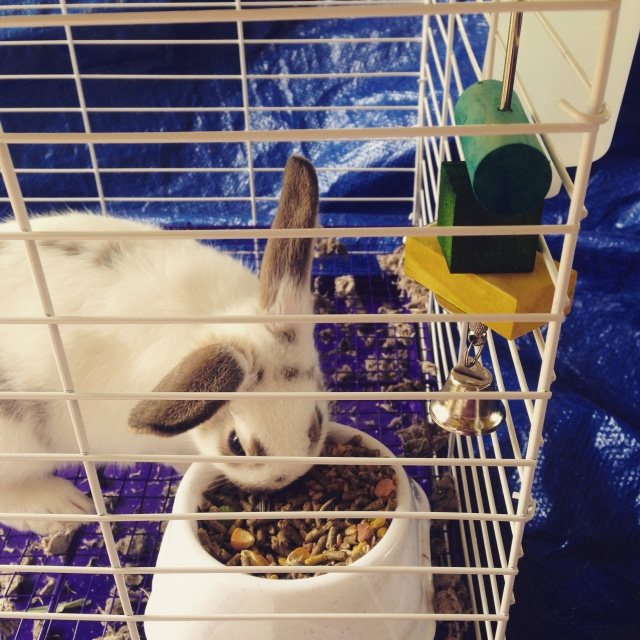 Deaf
QuestionQUESTION: Ok I have tried snapping at the ears
Deaf
QuestionQUESTION: Ok I have tried snapping at the ears
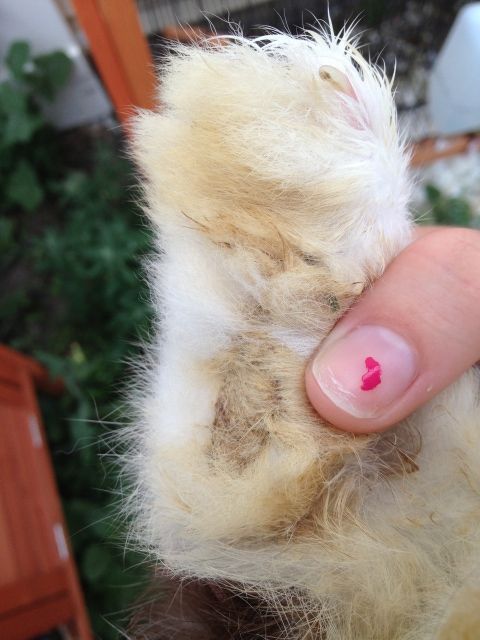 Hock on foot HELP
Question
foot
Hey guys,
I bought this rabbit in
Hock on foot HELP
Question
foot
Hey guys,
I bought this rabbit in
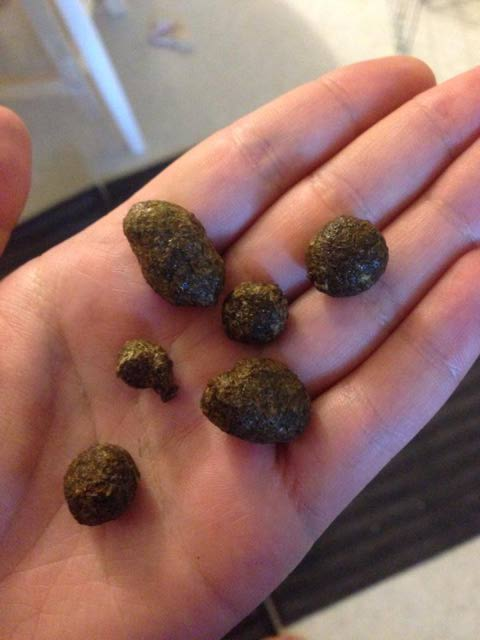 Young rabbits irregular poops
QuestionPoops
QUESTION: Hello!
Im stumped. My ne
Young rabbits irregular poops
QuestionPoops
QUESTION: Hello!
Im stumped. My ne
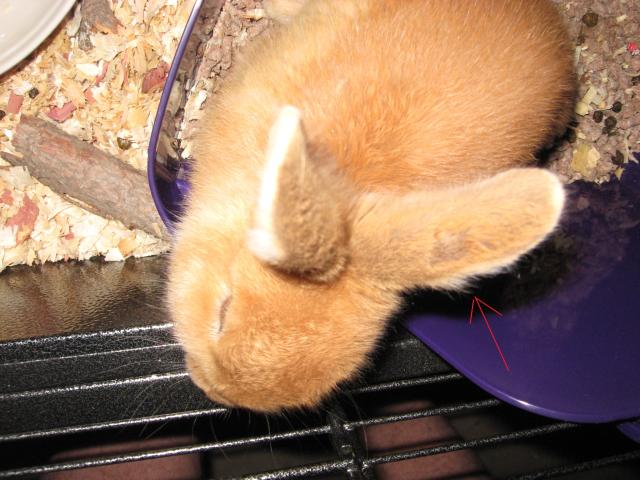 Rabbit Ear Problem?
Question
Rabbit Ear Problem
Hello there.
Our rabbit is
Rabbit Ear Problem?
Question
Rabbit Ear Problem
Hello there.
Our rabbit is
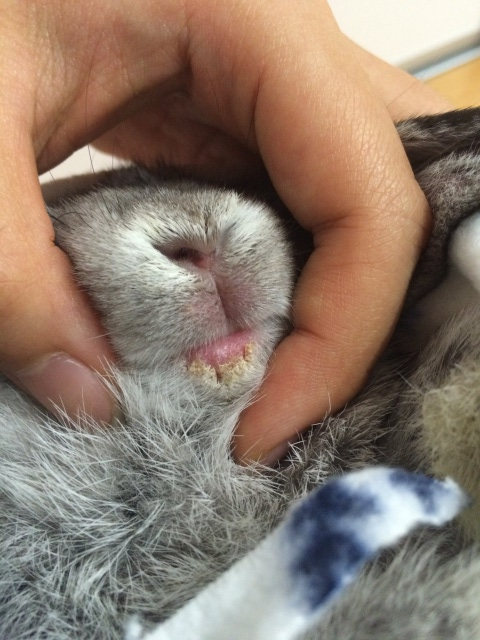 Thick hard dry skin on rabbits chin
Question
Dry Skin
Hello Pam
Ive recently bough
Thick hard dry skin on rabbits chin
Question
Dry Skin
Hello Pam
Ive recently bough